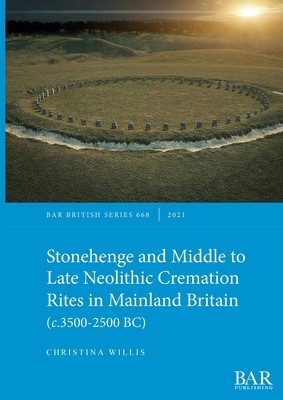
- We will send in 10–14 business days.
- Author: Christina Willis
- Publisher: British Archaeological Reports (Oxford) Ltd
- ISBN-10: 1407358340
- ISBN-13: 9781407358345
- Format: 21 x 29.7 x 2.6 cm, minkšti viršeliai
- Language: English
- SAVE -10% with code: EXTRA
Stonehenge and Middle to Late Neolithic Cremation Rites in Mainland Britain (c.3500-2500 BC) (e-book) (used book) | bookbook.eu
Reviews
Description
Neolithic Britain is characterised by its wide diversity in funerary and mortuary rites. However, a shift c.3500BC led to a rise in cremation burials associated with circular monuments and by c.3000BC, cremation was the dominant funerary rite. This book provides a comprehensive re-analysis of 628 cremation deposits from 84 sites across mainland Britain, including those from Stonehenge. It offers new insights and interpretations relating to a shift in social organisation and belief structures, and uses up-to-date methodology to discuss osteological, archaeological and chronological data. Together, this research suggests that cremation was specifically selected for certain members of society, and it also raises new questions about mobility and the role women played within the prehistoric landscape.
EXTRA 10 % discount with code: EXTRA
The promotion ends in 23d.17:52:33
The discount code is valid when purchasing from 10 €. Discounts do not stack.
- Author: Christina Willis
- Publisher: British Archaeological Reports (Oxford) Ltd
- ISBN-10: 1407358340
- ISBN-13: 9781407358345
- Format: 21 x 29.7 x 2.6 cm, minkšti viršeliai
- Language: English English
Neolithic Britain is characterised by its wide diversity in funerary and mortuary rites. However, a shift c.3500BC led to a rise in cremation burials associated with circular monuments and by c.3000BC, cremation was the dominant funerary rite. This book provides a comprehensive re-analysis of 628 cremation deposits from 84 sites across mainland Britain, including those from Stonehenge. It offers new insights and interpretations relating to a shift in social organisation and belief structures, and uses up-to-date methodology to discuss osteological, archaeological and chronological data. Together, this research suggests that cremation was specifically selected for certain members of society, and it also raises new questions about mobility and the role women played within the prehistoric landscape.


Reviews